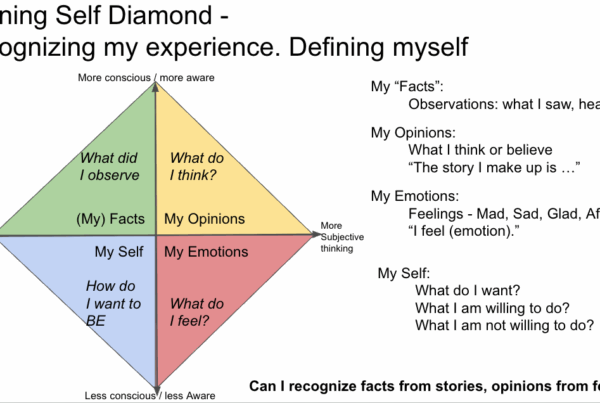
Why is forgiveness important? Because it’s good for us, whether it’s forgiving someone else or yourself. But adopting a systems perspective around a wrongdoing is a big shift for anyone. The more intense the situation, the harder it can be. (Before you continue, please note that extreme events can be very hard for individuals to put into a systems perspective. A systems perspective can involve a long time frame and societal level processes preceding the event that affects an individual. A systems perspective doesn’t ask why or if something is fair.)
Losing self
An important idea in family systems theory is about the gaining and losing of self in relationships. When I do something I don’t want to do, just to please or not disappoint other, I’m losing self. This differs from doing something I’d rather not do, but I do it because of my convictions or principles. That is holding on to self. Being forced into exercising because I fear the conflict with my partner is losing self. Going along with my partner, because I know it is good for me, that’s different. Choosing to do a different workout, while my partner does something else, is defining my self. It’s important to note that defining self does not impinge on other, nor does it force a particular choice on other. We are both free to choose what we will do.
Wrong doing takes self from other
A starting point for the topic of forgiveness is the concept that a wrongdoing takes self away from a person. This loss of self can be emotionally painful. There are emotional processes that can keep a person in a pattern of functioning impairs forgiving. I believe these processes vary in intensity with the degree that a person feels wronged. Emotional processes that reduce the discomfort of losing self can hinder the person from regaining that lost self. I don’t believe a person can truly forgive without working to regain the self that was lost.
Forgiveness and regaining lost self
The impinging act that needs to be forgiven took self away from the recipient of the impinging behaviour. The recipient was forced to accept something they did not want to; their self was forced to “go along” with other. This loss of self needs to be repaired, but this can only be done by the person wronged, not by the wrongdoer. I don’t believe someone else can “give” me self. (Theory says that I can borrow self from other, but that is a pseudo self, not solid self.)
Limits of cause and effect thinking
Most of the time, individuals operate with a cause-and-effect thinking. When something happens, it is because something “caused” it. This leads to blaming the individual that “caused” the wrongdoing. We then have a world of perpetrators and victims. The perpetrator was the wrongdoer, and the victim was the wronged. Across cultures and time, there have been various methods to “right”, the “wrong”. This is approach reduces our options for forgiving and regaining our lost self, because the “victim” depends on the perpetrator to make things right.
Widening the lens with systems thinking
The process of forgiving can benefit from a broader systems perspective of the situation and events that took place. Seeking a wider understanding is not saying what happened was okay. Understanding does not mean agreement. That is a critical point. A systems approach would seek to understand all the facts of the event. A systems perspective would seek to understand things like:
– who were all the players involved?
– what stressors were affecting them?
– how mature are the players?
– how unthoughtful were the players?
This is not about making excuses for someone else’s behaviour. Understanding the how, when, where, what, how much of any situation helps one learn how to avoid those situations again. It gives one agency to hold on to self.
The hardest question
Another aspect of taking a systems perspective is asking, “what part might I have played in this?” This is NOT about “blaming the victim.” It is often very hard for individuals to accept this idea. Again, more agency for self can come out of looking at this aspect of system functioning. A core tenet of systems is that every part contributes something to the system,s functioning. For example, it could be one or more of the following, was I:
– in the wrong place at the wrong time
– late with something, hence wrong time
– taking a shortcut, rushing
– trying to avoid effort, time, cost
– not paying attention
– not listening to my intuition
I can not stress enough that playing a part doesn’t make one wrong, or make something one’s fault. The impinging act still had to happen, and that wasn’t you. The value of understanding what role I might have played is that I can work to not do that in the future. It gives me more agency. I get to define self and my future behaviour. In many situations, some level of my immaturity contributed to what happened to me. Here’s an important point. In many situations, many factors contributed to the event, so there are many things to blame. But this means there is no ONE thing to blame. Blame just isn’t useful.
It happened. How do I want to show up now?
Another key point with systems is that I can’t fix the past, but I can work to keep the past from affecting my present and future. There is only now and going forward. A key question is: given this is what is what I am going to do about it?. This is the start of defining self and getting my lost self back. But one of the biggest blockers to this process is your system. And triangles.
Triangles can be a trap
Family systems theory posits that when two people have some level of tension between them, one or both will seek a third party to get on their side. This is a natural process and it can help lower one’s anxiety. Sometimes the third person can offer useful insights. But too often, the third person actually facilitates the level of tension and blocks a resolution. If a “wronged” person gets a lot of sympathy and validation, this can impede work to regain the lost self. The emotional process of triangles can make things worse.
Forgiveness and emotional process
Let’s say I have gotten to a place of not blaming and I’m not using triangles to be comforted and validated. I believe there are still strong emotional processes that can work to prevent me from moving forward with forgiveness. These can come from the stories I might have about what forgiveness means. Such stories (not facts) can make it very hard for me to forgive and move forward. The stories could include:
– I’m betraying myself and others if I forgive
– Forgiving means I condone or accept that behaviour
– It’s not fair to ‘forgive and forget’
– If I forgive, what will I do next?
– If I forgive, will I forget? Forgetting would be wrong?
– It’s too painful to confront the memories in order to forgive
– Forgiving means the wrong doer “won”
Forgiveness is not…
Forgiving is not betrayal, because I’m NOT agreeing with the wrongdoer. I am NOT saying what they did was okay. It’s as if I am carrying a heavy load and I are decide to put it down and not carry it anymore. It is still a heavy load. I will remember it was a heavy load. It will be a heavy load forever. But carrying it doesn’t make things better. It will wear me down and wear me out. There are better things to carry.
Reflecting on how I got the heavy load can help prevent me from getting it again. Or I may learn that life just provides heavy loads, but I don’t have to carry them forever. Since there is no ONE person or thing to blame for the load, I let go of blame. Since I understand how the load got so heavy, I have agency to avoid it in the future.
The wrong-doer can also put down their load. They will never forget it either. But they won’t be able to change and improve by carrying that load. Putting down the load frees them up to carry new and better things.
Carrying the load can take a lot of time and effort. It can consume a lot of one’s life. One can get very focused on the load, which distracts on from the pain of moving forward without a loved one or a desired future. But if I don’t deal with the pain, the pain will deal with me. I believe the pain will win in the end. The load won’t get lighter, the individual gets weaker.
Define Self to get back the lost self
Forgiving requires a strong defining of self. One has to become clear on how they want to be in the world now and going forward. What principles are truly important to them that will guide their thinking and behaviour? Defining myself means that I have to confront the stories I make up and the perspectives that I have that are too narrow and need to change. It means I have to live with the discomfort of life being painful and unfair.
Forgiveness is a choice
But defining self means I get to make choices. I get to see where I can change to improve my life. Not being a victim is an option for me. Now I can understand how my load came about in a broader context. I can recognize the heaviness of it and how hard it is to carry. This allows me to understand how I can put it down. The acceptance comes from understanding. This understanding allows for forgiveness. Or maybe one understands that there is no one thing to “blame” so there isn’t anything to forgive. There is an acceptance that comes from understanding and a conviction to define self in order to move forward.
I can choose to put down that burden and work on a new future. A future where the burden is a memory that I’ll honour. I can decide to never forget, even while I forgive, because I want to reclaim my “self” that was taken from me.
I’d like to give credit to Pumla Gobodo-Madikizela for inspiring this post with her article in the New York Times titled “Why Do We Fear Forgiveness”.
Also to Charles F. East for is Family Systems Journal (V9, N1, 2012) article “Triangles, togetherness and the challenge to forgive”
Thank you for your interest in family systems.
Comments are welcome: dave.galloway@livingsystems.ca
This post was inspired by this article: Why Do We Fear Forgiveness
Read more about Bowen Theory here
For an overview of Bowen Theory in Psychology Today: Bowen Theory.


